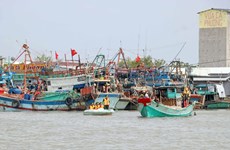Inflation slows in several Asian economies
Several economies reported slowing
inflation rate in July, largely because of a high-based comparison
caused by last summer’s oil-price surge, media reported.
Several economies reported slowing
inflation rate in July, largely because of a high-based comparison
caused by last summer’s oil-price surge, media reported.
Indonesia's annual inflation rate eased sharply to a nine-year low in July, fanning expectations the central bank will cut its key interest rate by 0.25 percentage points to 6.5 percent to boost economic growth, the Wall Street Journal Asia reported on Aug. 4.
The consumer-price index rose 2.71 percent from a year earlier, compared with 3.65 percent in June, the journal reported, citing the Central Statistics Agency.
Month-to-month, the index rose 0.45 percent due to higher basic food prices and education costs.
Annual core inflation, which strips out energy and food costs, slowed to 4.91 percent from 5.56 percent in June.
Meanwhile, consumer prices in Thailand fell for a seventh straight month in July, hitting their lowest level since the 1997-98 Asian economic crisis.
The consumer-price index fell 4.4 percent from a year earlier after declining 4 percent in June, the journal said, citing sources from the Thai Commerce Ministry.
The ministry also revised its 2009 inflation target to between a contraction of 1 percent and zero, which would again be the lowest since the aftermath of the Asian economic crisis.
The journal also cited the National Statistical Office of the Republic of Korea (RoK) that annual inflation sank to a nine-year low in July, mainly due to a recent decline in oil prices.
RoK consumer prices rose 1.6 percent in July from the same month last year, when a spike in oil prices caused inflation to shoot up to 5.9 percent. Economists say inflation appears to have hit bottom last month and may move upward from August, reflecting a pickup in domestic demand, the elimination of last year's high-based effect, and rebounding global fuel prices, according to the journal./.
Indonesia's annual inflation rate eased sharply to a nine-year low in July, fanning expectations the central bank will cut its key interest rate by 0.25 percentage points to 6.5 percent to boost economic growth, the Wall Street Journal Asia reported on Aug. 4.
The consumer-price index rose 2.71 percent from a year earlier, compared with 3.65 percent in June, the journal reported, citing the Central Statistics Agency.
Month-to-month, the index rose 0.45 percent due to higher basic food prices and education costs.
Annual core inflation, which strips out energy and food costs, slowed to 4.91 percent from 5.56 percent in June.
Meanwhile, consumer prices in Thailand fell for a seventh straight month in July, hitting their lowest level since the 1997-98 Asian economic crisis.
The consumer-price index fell 4.4 percent from a year earlier after declining 4 percent in June, the journal said, citing sources from the Thai Commerce Ministry.
The ministry also revised its 2009 inflation target to between a contraction of 1 percent and zero, which would again be the lowest since the aftermath of the Asian economic crisis.
The journal also cited the National Statistical Office of the Republic of Korea (RoK) that annual inflation sank to a nine-year low in July, mainly due to a recent decline in oil prices.
RoK consumer prices rose 1.6 percent in July from the same month last year, when a spike in oil prices caused inflation to shoot up to 5.9 percent. Economists say inflation appears to have hit bottom last month and may move upward from August, reflecting a pickup in domestic demand, the elimination of last year's high-based effect, and rebounding global fuel prices, according to the journal./.












